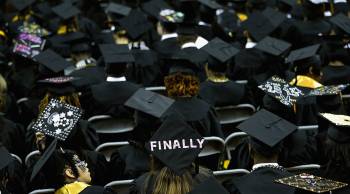Letters: Education, running, light bulbs
TEXT OF STORY
Kai Ryssdal: That music from us means it’s time for letters from you. We’ll start as many of you are this month with school and getting back to it. A couple of weeks ago we did a story on what colleges are doing to offer more “practical” majors, fields of study that will help graduates actually get ahead when they get their diplomas.
We quoted business executives as saying what they really want are employees with critical-thinking skills. Eric Bennett from Kansas City, Mo., would love to meet some of those executives.
ERIC BENNETT: I have an engineering degree, and I have changed career paths three times, continued education, plus have a proven record of creative problem solving. I have looked nationally for new opportunities and yet over nearly the past decade, I have been without a pay check over 40 percent of the time. Perhaps what business say they need and really want are not the same thing.
Let’s keep it on education here for just a second because last week’s commentary from George Mason University economist Tyler Cowen didn’t sit well with some of you. Professor Cowen theorizes that higher education works something like a placebo, convincing graduates they are smarter and more prepared for the working world than non-graduates are.
Because, he said, studying things like Walt Whitman isn’t really going to give students a leg up on landing that first job.
Dan Eastwood from Waukesha, Wis., wrote to disagree.
DAN EASTWOOD: Learning itself is a critical skill, which is gained through study., That study might be biology, business, physics, physiology, zoology, or even Walt Whitman. A college degree is an indication that the student is teachable and capable of jumping through the higher hoops of their profession.
As part of our series on what economists do for fun, Justin Wolfers’ analysis of his own running hobby sparked some strong reactions. Brad Serwer of Olney, Md., wrote in to say sometimes the benefits of an activity can outweigh the costs.
JUSTIN WOLFERS: As both a runner and a cardiologist, I recognize the difficult balance of work and recreation. Considering the fact that this “hobby” has such a positive impact on an individual’s health, the time spent running really is a small price to pay.
And finally, light bulbs. We reported last week on a new European law phasing out incandescent bulbs in favor of more energy-efficient compact fluorescents or CFLs. And this one’s on me.
I set up our story about German consumers stockpiling incandescents by saying CFLs give off a colder light than old-fashioned bulbs do. Andrew Beldecos from Atlanta, Ga., was just one of many who wrote in to set me straight.
ANDREW BELDECOS: I am a professional lighting designer. When my clients view incandescent next to various colors of fluorescent, the client will almost always choose the warm tone fluorescent light source as a more natural and desirable selection.
If you’ve got a bright idea, or a question, or a comment drop us a line.
There’s a lot happening in the world. Through it all, Marketplace is here for you.
You rely on Marketplace to break down the world’s events and tell you how it affects you in a fact-based, approachable way. We rely on your financial support to keep making that possible.
Your donation today powers the independent journalism that you rely on. For just $5/month, you can help sustain Marketplace so we can keep reporting on the things that matter to you.


















